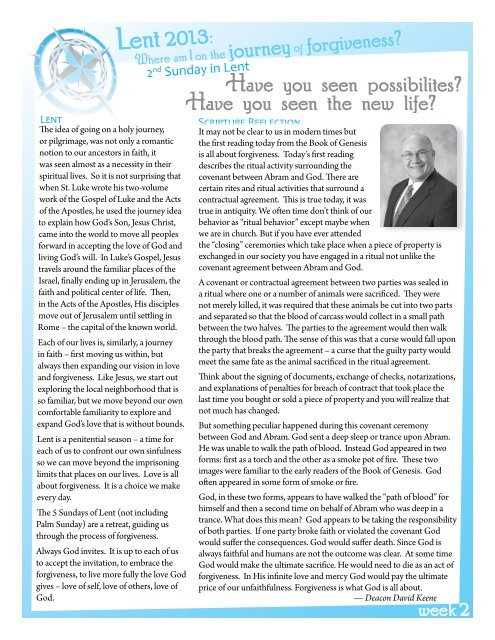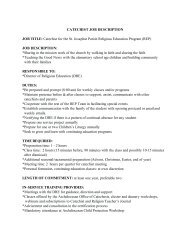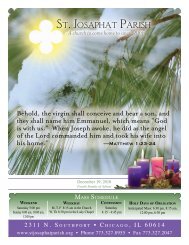February 24, 2013 - St. Josaphat Parish
February 24, 2013 - St. Josaphat Parish
February 24, 2013 - St. Josaphat Parish
You also want an ePaper? Increase the reach of your titles
YUMPU automatically turns print PDFs into web optimized ePapers that Google loves.
4<br />
ent <strong>2013</strong>:<br />
Where am on the<br />
Lent<br />
The idea of going on a holy journey,<br />
or pilgrimage, was not only a romantic<br />
notion to our ancestors in faith, it<br />
was seen almost as a necessity in their<br />
spiritual lives. So it is not surprising that<br />
when <strong>St</strong>. Luke wrote his two-volume<br />
work of the Gospel of Luke and the Acts<br />
of the Apostles, he used the journey idea<br />
to explain how God’s Son, Jesus Christ,<br />
came into the world to move all peoples<br />
forward in accepting the love of God and<br />
living God’s will. In Luke’s Gospel, Jesus<br />
travels around the familiar places of the<br />
Israel, finally ending up in Jerusalem, the<br />
faith and political center of life. Then,<br />
in the Acts of the Apostles, His disciples<br />
move out of Jerusalem until settling in<br />
Rome – the capital of the known world.<br />
Each of our lives is, similarly, a journey<br />
in faith – first moving us within, but<br />
always then expanding our vision in love<br />
and forgiveness. Like Jesus, we start out<br />
exploring the local neighborhood that is<br />
so familiar, but we move beyond our own<br />
comfortable familiarity to explore and<br />
expand God’s love that is without bounds.<br />
Lent is a penitential season – a time for<br />
each of us to confront our own sinfulness<br />
so we can move beyond the imprisoning<br />
limits that places on our lives. Love is all<br />
about forgiveness. It is a choice we make<br />
every day.<br />
The 5 Sundays of Lent (not including<br />
Palm Sunday) are a retreat, guiding us<br />
through the process of forgiveness.<br />
Always God invites. It is up to each of us<br />
to accept the invitation, to embrace the<br />
forgiveness, to live more fully the love God<br />
gives – love of self, love of others, love of<br />
God.<br />
l<br />
2 nd Sunday in Lent<br />
journey forgiveness?<br />
Have you seen possibilites?<br />
Have you seen the new life?<br />
Scripture Reflection<br />
It may not be clear to us in modern times but<br />
the first reading today from the Book of Genesis<br />
is all about forgiveness. Today’s first reading<br />
describes the ritual activity surrounding the<br />
covenant between Abram and God. There are<br />
certain rites and ritual activities that surround a<br />
contractual agreement. This is true today, it was<br />
true in antiquity. We often time don’t think of our<br />
behavior as “ritual behavior” except maybe when<br />
we are in church. But if you have ever attended<br />
the “closing” ceremonies which take place when a piece of property is<br />
exchanged in our society you have engaged in a ritual not unlike the<br />
covenant agreement between Abram and God.<br />
A covenant or contractual agreement between two parties was sealed in<br />
a ritual where one or a number of animals were sacrificed. They were<br />
not merely killed, it was required that these animals be cut into two parts<br />
and separated so that the blood of carcass would collect in a small path<br />
between the two halves. The parties to the agreement would then walk<br />
through the blood path. The sense of this was that a curse would fall upon<br />
the party that breaks the agreement – a curse that the guilty party would<br />
meet the same fate as the animal sacrificed in the ritual agreement.<br />
Think about the signing of documents, exchange of checks, notarizations,<br />
and explanations of penalties for breach of contract that took place the<br />
last time you bought or sold a piece of property and you will realize that<br />
not much has changed.<br />
But something peculiar happened during this covenant ceremony<br />
between God and Abram. God sent a deep sleep or trance upon Abram.<br />
He was unable to walk the path of blood. Instead God appeared in two<br />
forms: first as a torch and the other as a smoke pot of fire. These two<br />
images were familiar to the early readers of the Book of Genesis. God<br />
often appeared in some form of smoke or fire.<br />
God, in these two forms, appears to have walked the “path of blood” for<br />
himself and then a second time on behalf of Abram who was deep in a<br />
trance. What does this mean? God appears to be taking the responsibility<br />
of both parties. If one party broke faith or violated the covenant God<br />
would suffer the consequences. God would suffer death. Since God is<br />
always faithful and humans are not the outcome was clear. At some time<br />
God would make the ultimate sacrifice. He would need to die as an act of<br />
forgiveness. In His infinite love and mercy God would pay the ultimate<br />
price of our unfaithfulness. Forgiveness is what God is all about.<br />
— Deacon David Keene<br />
<strong>St</strong>. <strong>Josaphat</strong> <strong>Parish</strong> week 2





